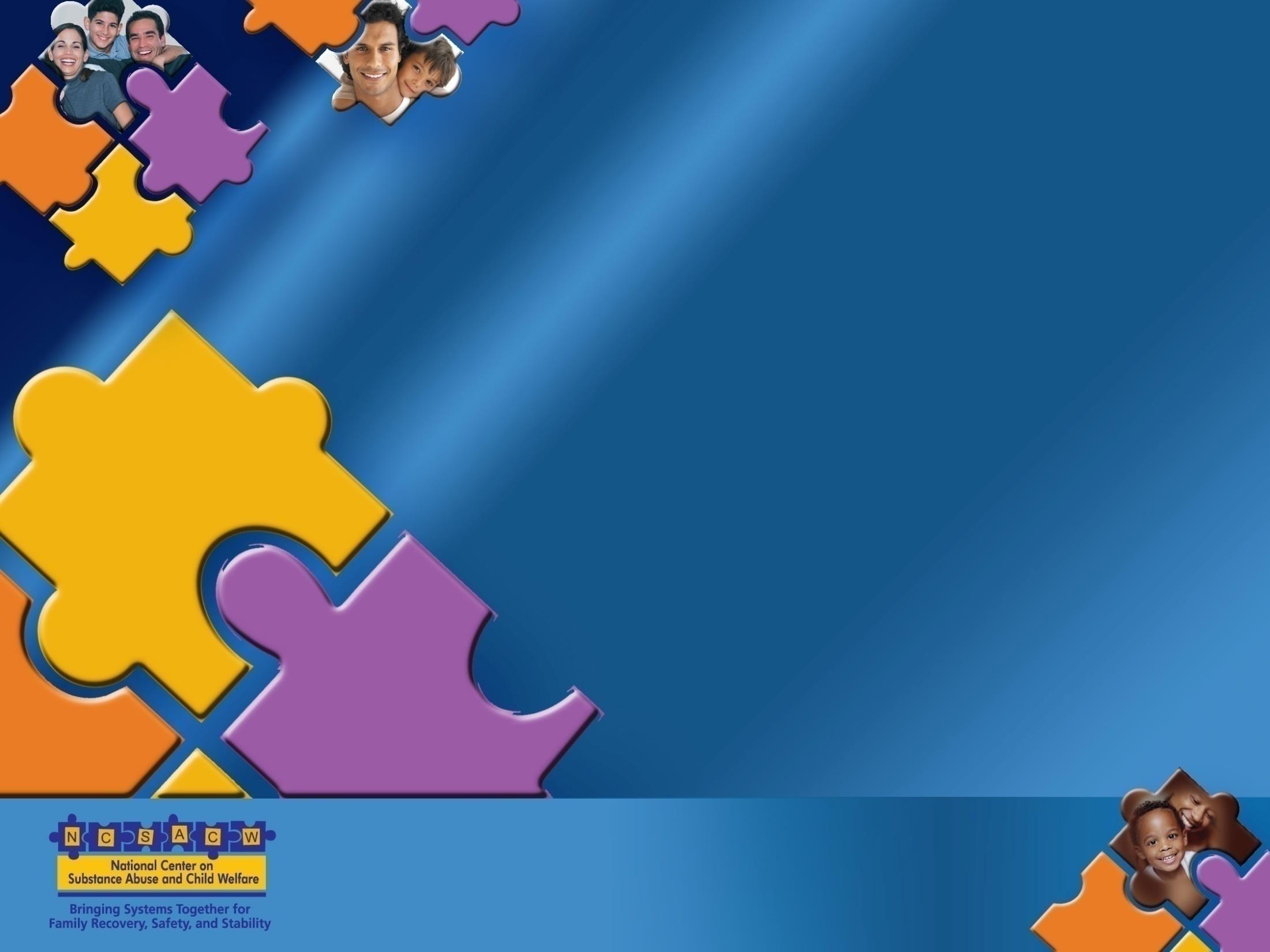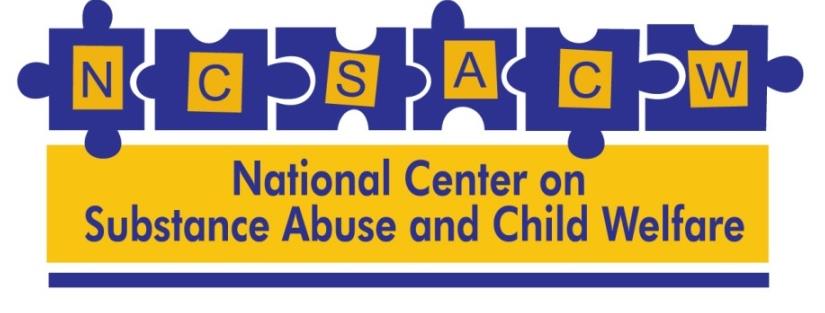Slide


Understanding Medication
Assisted Treatment (MAT) for
Families Affected by Substance
March 20, 2013
Baston, MPA, CAP, CPP



A Program of the
Substance Abuse and Mental Health Services Administration
Center for Substance Abuse Treatment
Administration on Children, Youth and Families
Office on Child Abuse and Neglect


Developing knowledge and
providing technical assistance to
federal, state, local agencies and tribes to
improve outcomes for families with
substance use disorders in the
child welfare and family court systems

• Nonmedical use: Use of prescription drugs
without a prescription, or use that occurred simply for the experience or feeling the effects caused by the drug rather than for legitimate medical reasons (over-the-counter use and legitimate use of prescription pain relievers are not included).1
• Medication-Assisted Treatment (MAT) is the use
of medications, in combination with counseling and behavioral therapies, to provide a whole-patient approach to the treatment of substance use disorders2 with an ultimate goal of patient recovery with full social function.3
• MMT: Methadone Maintenance Treatment -
Dispensing methadone at stable dosage levels for a period in excess of 21 days in the supervised treatment of an individual for opioidaddiction.4
Goals of MAT
MAT is prescribed to address very specific and highly individualized goals that vary by person:
• Prevention or reduction of withdrawal symptoms• Prevention or reduction of drug craving• Prevention of relapse to use of addictive drug• Restoration to or toward normalcy of any
physiological function disrupted by drug abuse
• Blockade of euphoric effects of illicit self-
MAT is not a new practice
• MAT is not new! While you may be hearing more
about the use of medications (in combination with behavioral therapies) to address the emerging prescription painkiller epidemic, MAT has been in place as a proven effective practice for decades e.g. Disulfiram (Antabuse®) for more than 50 years and methadone for more than 40 years.5
Treatment of alcohol dependence
In the US, MAT has been demonstrated to be effective in the treatment of alcohol dependence with Food and Drug Administration (FDA) approved drugs such as:
• Disulfiram (Antabuse®)• Naltrexone (oral = ReVia®, Depade® or monthly
extended-release injectable Vivitrol®)
• Acamprosate (Campral®)6
Other medications for alcohol
• In addition, some benzodiazepines (Valium and
Xanex) have been approved to treat alcohol withdrawal symptoms.7
• Other drugs are not FDA-approved to treat
alcohol abuse, but have, in a research setting, shown promise in reducing drinking.8
• Marijuana has been used to treat
– Loss of vision from glaucoma– Nausea that can come with AIDS and cancer
– The pain of multiple sclerosis
• Marinol is a prescription medicine that contains
marijuana's active ingredient.
• Marinol is used to treat nausea and vomiting.9
• Note: There is no reason to believe that inhaled smoke is
an acceptable delivery mode.10
MI's nonmedical use of pain relievers
• Michigan rates among the top 15 at 5.11%
nationally for nonmedical use (e.g. misuse) of pain relievers among persons 12 and older (2010-2011 NSDUH data) and also among 18-25 year olds 11.74%.
• During this same time period, Michigan's rate
among 12- 17 year olds was 6.35%.11
Common Opioids12, 13
Heroin (injected, smoked, or nasally inhaled) Buprenorphine (e.g., Suboxone, Subutex) Fentanyl (Duragesic patch, lozenge, solution) Hydromorphone (Dilaudid) Hydrocodone (e.g., Vicodin, Lortab, Lorcet) Methadone (Dolophine or Methadose in
diskette/wafer, pills, liquid)
Morphine (MSContin, MSIR, Avinza, or Kadian) Oxycodone (e.g., OxyContin, Percodan, Percocet) Codeine—an ingredient in some cough syrups and
in one Tylenol product
Treatment of opioid dependence14
In the US, MAT has been demonstrated to be effective in the treatment of opioid dependence with:• Methadone (Dolophine or Methadose)• Buprenorphine (Subutex, Suboxone)• Naltrexone (oral = ReVia®, Depade® or monthly
extended-release injectable Vivitrol®)
Methods of Dispensing
• Methadone to treat addiction is dispensed only
at specially licensed treatment centers. Buprenorphine and naltrexone are dispensed at treatment centers or prescribed by doctors.15
• A doctor must have special approval to prescribe
buprenorphine. Some people go to the treatment center or doctor's office every time they need to take their medication. People who are stable in recovery may be prescribed a supply of medication to take at home.16
Methadone
• Methadone is a synthetic opioid that blocks the
effects of heroin and other prescription drugs containing opiates. Used successfully for more than 40 years, methadone has been shown to eliminate withdrawal symptoms and relieve drug cravings from heroin and prescription opiate medications.17
• Methadone has been in use since the 1960s to
treat heroin addiction and is still an excellent treatment option today.18
• Methadone is an agonist that mitigates opioid
withdrawal symptoms and, at higher doses, blocks the effects of heroin and other drugs containing opiates. Methadone compliance reduces injection opioid use, thereby helping to close off one route of HIV transmission for patients.19
• Methadone must be dispensed to patients at a
Substance Abuse and Mental Health Services Administration (SAMHSA)-certified opioidtreatment program (OTP) facility—with daily doses provided at the clinic—until the patient is deemed stable enough to receive take-home doses.20
Methadone is taken daily (liquid and a wafer form). It has been used successfully for more than 40 years in the treatment of opioid dependence. Medication is integrated with psychosocial therapy to address the unique needs of each patient.
Buprenorphine for opioid dependence
• Buprenorphine (Suboxone® and Subutex®)
relieves drug cravings without producing the "high" or dangerous side effects of other opioids.
• The FDA approved buprenorphine in 2002, is
available at OTPs, but is most often prescribed by physicians in office-based settings making it more accessible than methadone.
• Physicians have to first receive special training,
be granted a DEA waiver and can only treat up to 100 patients at a time.
How different from methadone?
• Only qualified doctors with the necessary DEA
(Drug Enforcement Agency) identification number are able to start in-office buprenorphinetreatment and provide prescriptions for ongoing medication. CSAT (Center for Substance Abuse Treatment) will maintain a database to help patients locate qualified doctors. These medications are available in most commercial pharmacies.21
Naltrexone for opioid dependence
• Naltrexone is a non-addictive antagonist that
prevents opioid receptors from being activated by agonist compounds, such as heroin or prescription pain killers, and is reported to reduce craving and prevent relapse.22
• If a patient who has been administered naltrexone
attempts to continue taking opioids, he or she is unable to feel any of the opioid's effects due to naltrexone's blocking action.23
Naltrexone for opioid dependence
• Naltrexone can be prescribed by any healthcare
provider who is licensed to prescribe medications (e.g., physician, doctor of osteopathic medicine, physician assistant, and nurse practitioner). Special training is not required; the medication can be administered in OTP clinics.24
MAT for opioid has 3 elements
• Medication-assisted treatment is one way to help
those with opioid addiction recover their lives. There are three, equally important parts to this form of treatment:
• Medication • Counseling • Support from family and friends.25 • As we will discuss later, system support is also
essential as is reducing MAT barriers and stigma.
Duration of treatment medication
• People can safely take treatment medication as
long as needed— for months, a year, several years, even for life. Plans to stop taking a medication should ALWAYS be discussed with a doctor.26
Benefits of MAT27
As part of a comprehensive treatment program, MAT has been shown to:• Improve survival• Increase retention in treatment • Decrease illicit opiate use • Decrease hepatitis and HIV seroconversion• Decrease criminal activities• Increase employment• Improve birth outcomes among opioid
dependent pregnant women
Pregnancy and MAT
Treating opioid dependency during
• Methadone has been accepted since the late
1970s to treat opioid addiction during pregnancy.
• In 1998, an NIH consensus panel recommended
methadone maintenance as standard of care for pregnant women with opioid addiction.
• The FDA licensed and regulated methadone
treatment programs, including treatment for pregnant women starting in 2001.
ASAM/ACOG Committee Opinion
• The current state of care for pregnant women
with opioid dependence is referral for opioid-assisted therapy with methadone, but emerging evidence suggests that buprenorphine also should be considered. Medically supervised tapered doses of opioids during pregnancy often result in relapse to former use. Abrupt discontinuation of opioids in an opioid-dependent pregnant woman can result in preterm labor, fetal distress, or fetal demise.29
Methadone and Pregnancy30
• Withdrawal for pregnant women is especially
dangerous because it causes the uterus to contract and may bring on miscarriage or premature birth. By blocking withdrawal symptoms, MMT can save the baby's life. Additionally, MMT can help the mother stop using needles, which is a primary route of infection for drug users. More importantly, it can allow the mother to regain quality of life.
Methadone and pregnancy31
• Undergoing MMT while pregnant will not cause
birth defects for the baby, but some infants may go through withdrawal after birth. Withdrawal does not mean the baby is addicted.
• Studies have shown that the dose of medication
has no bearing on whether or not the baby experiences withdrawal. Infant withdrawal usually begins a few days after the baby is born but may begin two to four weeks after birth.
Buprenorphine and pregnancy32
• Current guidelines recommend that
buprenorphine be prescribed to pregnant women only when the benefits outweigh the risks and the patent has refused methadone (CSAT, 2004)
Child Welfare Issues
Issues for Child Welfare Systems
What are the issues? • Use of MAT as exclusionary criteria for child welfare
programs, particularly Family Drug Courts.
• Misunderstanding of the use of MAT, particularly
Methadone treatment, in substance abuse treatment and how it relates to child safety.
• Requirement of minimal "dosing" of MAT
medications for pregnant women or as a term for reunification.
• Positive toxicology result for methadone at birth as a
presumptive cause for child removal.
• Not all court officials, child welfare staff, or even
behavioral health professionals understand that MMT is the recommended course of treatment for pregnant opioid-dependent women and that it reflects a mother's commitment to living a sober and responsible life.
Medically assisted detoxification
• For opioid abusers who do not wish to enter
treatment or do not qualify for ongoing maintenance therapy, some treatment programs provide medically assisted detoxification services, which involve weaning patients off addictive substances and managing withdrawal. However, research shows such programs are closely associated with relapse.33
Medically assisted detoxification
• Medically assisted detoxification is only the first
stage of addiction treatment and by itself does little to change long-term drug abuse. Although medically assisted detoxification can safely manage the acute physical symptoms of withdrawal and can, for some, pave the way for effective long-term addiction treatment, detoxification alone is rarely sufficient to help addicted individuals achieve long-term abstinence. 34
Medically assisted detoxification
• Patients should be encouraged to continue drug
treatment following detoxification. Motivational enhancement and incentive strategies, begun at initial patient intake, can improve treatment engagement.35
• Because tolerance to opioids fades rapidly even
during a short period of abstinence, one episode of opioid misuse following detoxification can result in a life-threatening or deadly overdose.36
MAT myth busters
• "Methadone clients are ‘still using' (continuing drug
use) and not really engaged in recovery."
• "Clients get high on methadone and Suboxone."
• FACT: Taking medication for opioid addiction is
like taking medication to control heart disease or diabetes. It is NOT the same as substituting one addictive drug for another. Used properly, the medication does NOT create a new addiction. It helps people manage their addiction so that the benefits of recovery can be maintained.37 With correct dosing, MAT clients' withdrawal symptoms are ameliorated and no high is produced.
MAT myth busters38
• Some child welfare system-involved pregnant
women participating in MAT are being told by some child welfare staff to get off of the MAT as they are harming their baby. Others are asked about their plans to decrease their doses and discontinue MAT.
• FACT: Methadone is not harmful to the fetus if the
mother is stable and under the medical care of an OTP. No one should practice medicine without a license! Moreover, this advice is contraindicated and could result in far more harm to both mother, fetus and baby.
MAT myth busters
• Often recommended to reduce maternal
methadone dose to avoid "harming" fetus.
• FACT: A non-therapeutic maternal dose may
promote supplemental drug use and increase risk to the fetus.39
• Bottom line …MAT involves extremely complex,
highly individualized medical treatments that should only be considered after consultation with a physician who has received training in these therapies.
MAT myth busters40
• Positive toxicology result for methadone at birth
as a presumptive cause for child removal.
• FACT: Methadone (or other properly
administered medication) in a stabilized patient will not cause sedation or prevent the individual from being a responsible parent.
• Methadone maintenance treatment and
buprenorphine do not have the narcotizing effects of heroin and does not trade one addiction for another.
MAT myth busters41
• Use of MAT as exclusionary criteria for child
welfare programs, particularly Family Drug Courts. Some parents are required by child welfare and/or court systems to discontinue MAT as a pre-requisite to reunification.
• FACT: If parents are pushed to abandon their
MAT protocol destabilization of a family could result.
• It is not safe for mothers receiving MAT to
breast-feed their baby.
• FACT: Breast-feeding is safe unless the mother
has an infectious disease, such as HIV. Hepatitis C-positive women are able to safely breastfeed but should check with their physicians first.
• CPS representatives should work with OTPs and
read the SAMHSA/CSAT publication TIP #43, "Medication-Assisted Treatment for OpioidAddiction in Opioid Treatment Programs", especially Chapter 13- Treating Pregnancy.
Considerations for Child Welfare
Policy and Practice
MAT Policy and Practice Considerations
Discussion & jurisdiction examples of:• Collaboration with multiple stakeholders –
primary care providers, substance abuse treatment/ MAT providers and the courts
• Cross systems release of information• Cross systems role clarification• Clearly written policies and guidelines for
• Clearly written policies and guidelines for staff
Policy and Practice Framework:
Five Points of Intervention (Apply to SEI)
1. Pre-pregnancy awareness of
substance use effects
2. Prenatal screening
Initiate enhanced
3. Identification
4. Ensure infant's safety and
Respond to parents'
respond to infant's needs
5. Identify and respond
to the needs of
Identify and respond
Infant Preschooler
to parents' needs
Child Adolescent
SEI - The Framework: Five Points of
• Pre-pregnancy and public awareness• Prenatal screening and support• Screening at birth• Services to infants 0-3 and beyond• Services to parents
So—the birth event is one of several opportunities
to make a difference, not the only one!
Closing: Making the business
case for MAT
• MAT is the use of medications, in combination
with counseling and behavioral therapies, to provide a whole-patient approach to the treatment of substance use disorders. Research shows that when treating substance-use disorders, a combination of medication and behavioral therapies is most successful. Medication assisted treatment (MAT) is clinically driven with a focus on individualized patient care.43
• … "Insurers and policy makers must strive to
learn about available medicines and promote policies that ensure that use of these medications is covered as part of a comprehensive approach to treating prescription and illicit drug dependence."44
• The National Institute of Drug Abuse (NIDA)
Principles of Effective Treatment states the following: "Medications are an important element of treatment for many patients, especially when combined with counseling and other behavioral therapies. For example, methadone, buprenorphine, and naltrexone (including a new long-acting formulation) are effective in helping individuals addicted to heroin or other opioidsstabilize their lives and reduce their illicit drug use."45
NIDA cont.
• Acamprosate, disulfiram, and naltrexone are
medications approved for treating alcohol dependence. For persons addicted to nicotine, a nicotine replacement product (available as patches, gum, lozenges, or nasal spray) or an oral medication (such as bupropion or varenicline) can be an effective component of treatment when part of a comprehensive behavioral treatment program.46
The National Quality Forum
• The National Quality Forum has developed
consensus standards for addressing substance use illnesses. Four of the eleven standards focus on the use of medications. Specifically, they state that everyone receiving detoxification or treatment for opiate, alcohol, or nicotine dependency should be offered medications.47
• Medications may also become an essential
component of an ongoing treatment plan, enabling opioid-addicted persons to regain control of their health and their lives.48
10 Element Framework
Training and Staff Development
Understanding Substance Abuse and
A Guide for Child Welfare Workers
• Discusses the relationship of alcohol and drugs to families in the child welfare system
• Provides information on the biological, psychological, and social processes of alcohol and drug addiction to help staff recognize when substance abuse is a risk factor in their cases
• Describes strategies to facilitate and support alcohol and drug treatment and recovery for families affected by substance use disorders
Available online at
Web-based Screening Tool
• NIDA provides a Web-based tool that helps
clinicians screen for tobacco, alcohol, and illicit and nonmedical prescription drug use, and suggests levels of intervention.
• For more information about contact the Center
for Substance Abuse Treatment (CSAT) Buprenorphine Information Center at 866-BUP-CSAT, or via email at or
To Obtain a Copy:
Pamela Petersen-Baston, MPA, CAP, CPP
National Center on Substance Abuse
And Child Welfare,
Children and Family Futures
Phone: 1 (866) 493-2758
Questions and
Source: http://www.cffutures.org/files/MATFinal.pdf
Heft Nutztierhaltung 2/01 Abdruck in Absprache mit der Redaktion und unter Quellenangabe gestattet Inhaltsverzeichnis: • Veranstaltungen . 1 • Von Borell, E.: Editorial: 15. IGN-Tagung "Tierschutz und Nutztierhaltung" (2001) . 3 • EKAH und EKTV (Hrsg.): Die Würde des Tieres (2001) . 4 • Brilling, W.: Rinderzucht im Wandel (2001) . 4
Issues in Withholding & Monitoring of Withholding of under the Income Tax Ordinance, 2001 August 20, 2013; KHI Conducted by:Syed Zafar AhmedDirector Welcome Note You all are welcome here today in this presentation. Todays workshop is based on the law of Withholding of Income Tax and its Monitoring by the Income Tax Department under the Income Tax Ordinance, 2001.









